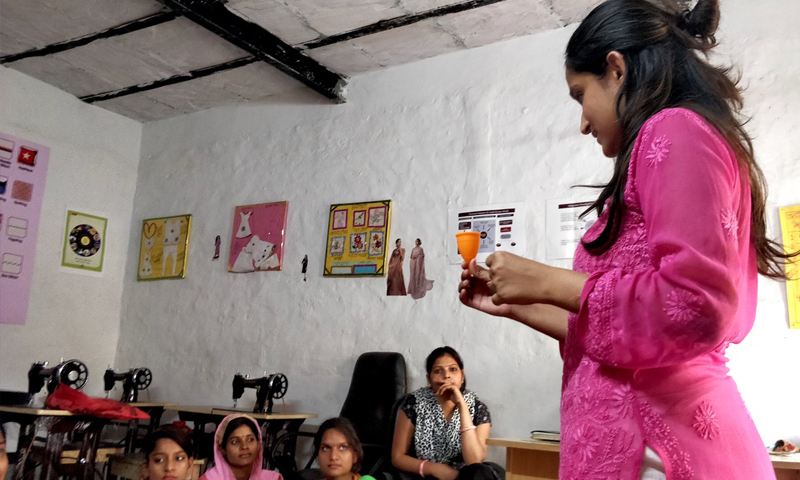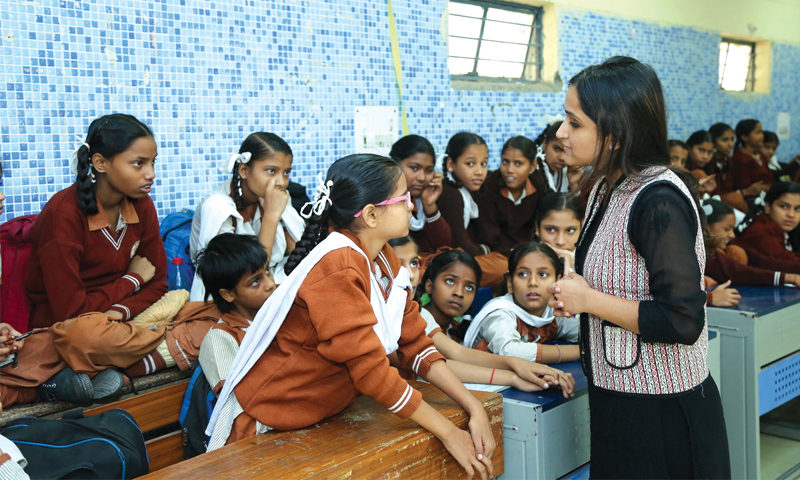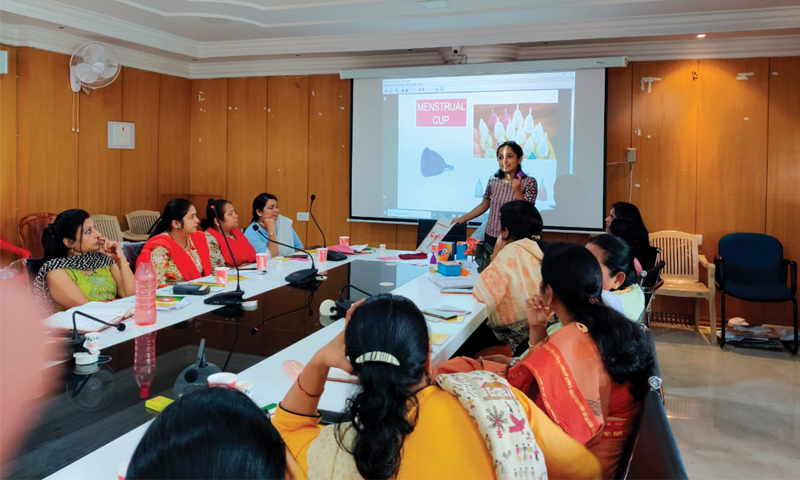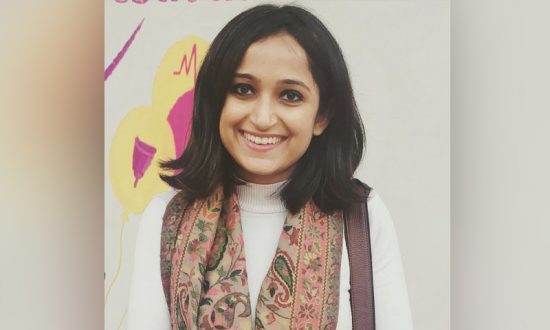According to the World Health Organisation (WHO), there were 355 million menstruating women in India in 2018. A National Family Health Survey (NFHS) last year found that 62 percent of women in the 15-24 age group use unsuitable products for menstrual protection. Poor hygiene during periods often causes physiological and psychological repercussions like reproductive tract infections, depression, fear, and frustration, low confidence, and restricted mobility. This eventually leads to school absenteeism and low workforce participation of menstruators. Additionally, there are deep-rooted taboos that exist, perpetuated by cultural context, lack of knowledge and patriarchy. With education and society being closely interlinked, education systems reflect the beliefs of society. With a culture of silence around sexuality and menstruation in society, education also replicates that silence- with very brief knowledge being mentioned in the school curriculum, teachers skipping over or not exploring in-depth topics related to sexual and reproductive health and a dearth of focus on making the knowledge inclusive. Hence the taboos continue across urban and rural areas, irrespective of income and literacy levels. Living in the 21st century, we have seen society evolve around us substantially.

Nowadays, everyone addresses social issues out in the open but the topic of periods or sexual and reproductive health is still hushed up. They quickly wrap it up or change the topic, like in the olden days. Calling menstruation everything other than the word itself and showing blue liquid instead of blood on sanitary napkin advertisements makes us go back to square one, despite our society developing on so many levels. Lack of awareness about menstruation and menstrual hygiene is pretty evident in India. Although the urban and upper-class population use sanitary napkins, women in rural areas are still using rags, ash, straw, etc. Most times if the cloth is used, it is not dried in the sun as menstruators feel ashamed and embarrassed, which can lead to multiple infections and put their lives in danger.
Meet Alakshi
Alakshi Tomar started out in the corporate world, and as an Accenture employee, felt a deep urge to solve the various problems she observed in society. She started volunteering to teach people with disabilities on job skills, an experience that transformed her and she realized her ‘calling’. Alakshi decided to quit her job and join the Gandhi Fellowship, working to improve the quality of education in government schools in Mumbai. While working with schools and living in slum communities during her Gandhian Fellowship, she saw the massive neglect around menstrual hygiene and health. Facing outright discrimination, infrastructural and mobility challenges, myriad taboos were commonplace during ‘that time of the month’ – girls were not allowed to take a bath during periods or interact with elders and men. She dug deeper, mobilized a team of peers, conducted awareness workshops and collaborated with local politicians to set up a low-cost sanitary napkin manufacturing unit, with a few women running it. But she failed to make the unit sustainable as most of the workers dropped out. The women, while willing to be trained and run the enterprise, were restricted by their families, the community leaders, but also by their own confidence and conditioning.
This experience gave her a unique insight into the power of education and skill development to break cyclical poverty. However, with the repeated emergence of rampant marginalization of women, during her stay in the Mumbai slums for 3 months as a part of Community Immersion during the Fellowship, she realized that without mobility and freedom, achieving any goal becomes extremely tough. This made her commit to the issue of menstruation and women’s livelihood for the long-term.
In another part of the world, Shivangi, a yoga teacher, a dive enthusiast, and Alakshi’s friend, lived a fast-paced life until she got her periods. The crippling pain before and during that time made her tired and weak, and she ended up wasting an entire week because of it. She decided to give menstrual cups a shot after learning about the importance of Menstrual Hygiene and Education. The cups were safe, comfortable and she felt like she got an extra week every month!
How It All Started…
Like most urban women, Alakshi and Shivangi, Co-founder of TruCup, used sanitary napkins until they started using menstrual cups, which changed their mindset completely. A chance WhatsApp conversation between the two made them realize that they were the only two people using menstrual cups in their group of 15 friends from school. They felt that there was an urgent need to create the perfect cup for all the menstruating women in the world. The Cup solved all the problems they had identified previously- accessible & safe menstrual product, affordable as it lasted for 8 years, comfortable, helping with mobility during periods and taboo-shattering, THE panacea for all menstrual problems! Hence came TruCup, a company built for every menstruator who is conscious about the products they use and how damaging it is to their body and the environment. Alakshi advocates promoting healthy, positive and sustainable period practices among all menstruators. TruCup was established to scale menstrual solutions across South Asia. She is passionate about tapping into the deepest potential of women, which is limited by patriarchy and social constructs of caste, class, and religion.

Not An Easy Task To Accomplish
Though menstrual cups are easy to use and a much healthier option for women, Alakshi noticed that changing mindsets and consumer habits was one of the major challenges for TruCup. Compared to sanitary pads and cloth pads, TruCup claims to not cause any discomfort as it is inserted inside the body and can’t be felt. But owing to the misplaced religious and cultural beliefs, along with conditioning around the body and the age-old taboo related to virginity, many girls feared to use the menstrual cups. Also, during awareness workshops, a lot of girls would tell Alakshi that their mothers would never allow them to use menstrual cups. Though they are not able to convince them quickly, slowly and surely, some of the women were able to break through the conditioning and started using their TruCups.
More Than Just Menstrual Cups
TruCup is not just about menstrual cups, it also focuses on menstrual health education, body positivity, sexual and reproductive health. With their TRUSocial program, they enable, empower, and enlighten menstruators by educating them with in-depth knowledge, tools, processes, products for menstrual management towards positive menstruation in rural and urban communities. With this, TruCup intends to make menstruation inclusive for all genders, hence using the word “menstruators”. This acknowledges that not all menstruators are women and not all women menstruate. Also, they plan to include men in the conversations, addressing their questions, encouraging them to engage with issues related to menstruation and getting their support to spread the word.

TruCup is also spreading awareness about menstruation by giving in-depth knowledge about menstruation management through partnerships. They have also been collaborating with various NGOs, Corporate houses and the Government to host workshops on Menstrual Hygiene. Menstruation has been a topic of taboo for a long time. Taking care of yourself, during menstruation or any other day, is immensely important. Even a little negligence in managing your menstrual hygiene can harm your body to a great extent. The importance of menstrual hygiene is not properly acknowledged and is not given the attention that it needs. Empowering women through education and involving them more into the decision-making process can play a huge role in improving the menstrual health in a community and overcome the taboos related to menstruation.
It is extremely important to create awareness about good menstrual practices for a better tomorrow for menstruators out there. With the revolution for women’s health on the way, Alakshi aims to educate rural and urban women about the benefits of menstrual cups and other reusable menstrual products, for the environment and their health in the long run. With TruCup, she intends to form a tribe of healthy and confident menstruators. Alakshi’s vision of promoting menstrual health among rural women is highly praiseworthy and she continues to be an inspiration to everyone around her!




